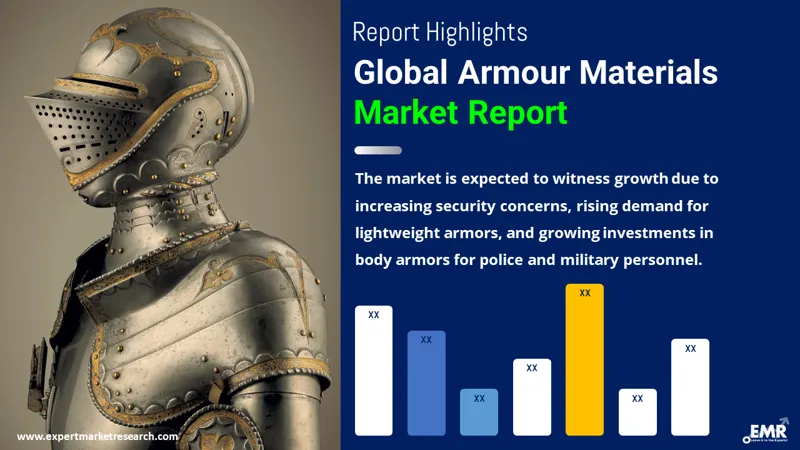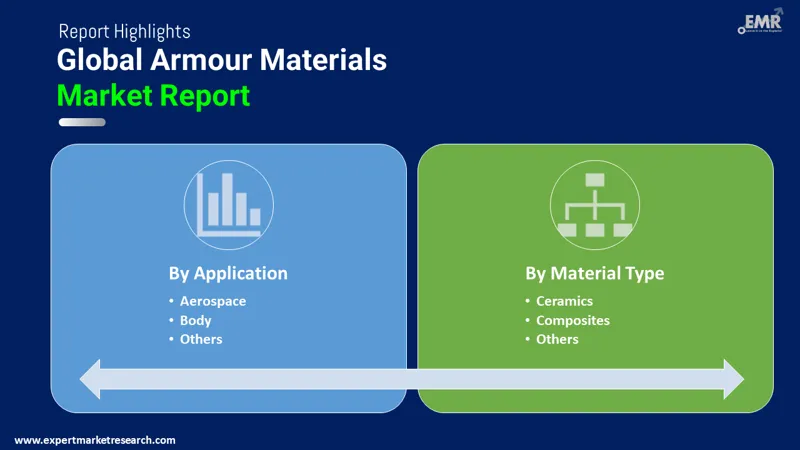
Consumer Insights
Uncover trends and behaviors shaping consumer choices today
Procurement Insights
Optimize your sourcing strategy with key market data
Industry Stats
Stay ahead with the latest trends and market analysis.
The global armour materials market size attained a value of USD 13.49 Million in 2025. The market is expected to grow at a CAGR of 6.20% between 2026 and 2035, reaching almost USD 24.62 Million by 2035.
Base Year
Historical Period
Forecast Period
Compound Annual Growth Rate
6.2%
Value in USD Million
2026-2035
*this image is indicative*
Evolving threat scenarios, rising security concerns, increasing military expenditures, and demand for lightweight, efficient and effective solutions are expected drivers of the global market for armour materials.

Read more about this report - REQUEST FREE SAMPLE COPY IN PDF
The ballistic panels employed in bulletproof vests may be made of different types of material. Body armours are required to undergo particular tests before they may be sold; some types of body armour, like Zylon, had to be recalled as the body armour showed rapid degradation after a short duration. This underlines the importance of high-quality material in the production of body armour. In modern times, several types of high-quality materials are used to manufacture body armour. These materials have significantly contributed to the growth of the global armour materials market. Some such materials are explained below.
Aramids: Aramids are synthetic fibers that exhibit outstanding heat-resistant properties and strength. Aramids were developed in the early 1960s and primarily commercialized by DuPont™ who created a meta-aramid named Nomax®. DuPont™ made further developments and introduced the first para-aramid Kevlar®® in 1973. These developments led to significant changes in the bulletproof vest industry; para-aramid materials allowed manufacturers to create lightweight and flexible bulletproof vests that offered high levels of protection.
Ultra-high-molecular-weight polyethylene (UHMWPE): This is another popular material for ballistic panels and employed in several modern types of body armour. While it is a kind of polyolefin (made up of very long chains of polyethylene), its characteristics are similar to para-aramids. The strength-to-weight ratio for UHMWPE have been shown to be up to 40% more than that of conventional para-aramid fibers. Thus, it is gaining significant popularity in the body armour market, with several companies introducing UHMWPE based body armour, like Dyneema® and Spectra®.
Hard armour materials: Earlier, hard armours were manufactured from metals such as steel, but these were weighty and often ineffectual. Like soft body armour panes, modern hard armour may be manufactured from a variety of materials. Popular hard armour panes are made of ceramics or ceramic composites, generally with para-aramid backing, like Kevlar®®.
Polyethylene and Monolithic based hard armour plates have also been developed, which while lighter than ceramic based hard armour, are costlier. Ballistic helmets and other kinds of hard armour are generally made of a para-aramid base encased in strong thermoplastic resin. The resultant material is lightweight and thin, which may be worn comfortably for longer durations.
The technologies used in body armour may also be found in the insides of military ground vehicles and helicopters. For example, DuPont™ Kevlar® technology is enabling the development of strong, lightweight, and flame and heat resistant armour systems and spall protection for a variety of ships, vehicles, airplanes and helicopters.
Companies like Saint-Gobain Performance Ceramics & Refractories offer outstanding design flexibility with innovative and consistent ceramics. The company employs high-performance, lightweight ceramic protection materials to offer protection solution for vehicles and aircraft. The panels are drawn from several shapes, such as hexagons, squares and rectangles. Silicon carbide and boron carbide ceramic tile armour assemblies by the company are employed to safeguard land vehicles, fixed-wing and rotary-wing aircraft.
Constantly evolving threat scenarios require continual development in protective equipment for personnel as well as non-human assets. Military and law enforcement personnel need lightweight, high performance, and affordable body armours that may ensure high levels of protection in a variety of circumstances, including extreme scenarios. At the same time, assets such as vehicles and aircraft also need to be safeguarded from attacks. This need for continual development and modernization of protective equipment is expected to drive the market.

Read more about this report - REQUEST FREE SAMPLE COPY IN PDF
“Global armour materials market report and forecast 2026-2035” offers a detailed analysis of the market based on the following segments:
By type, the market is segmented into:
By application, the market is classified into:
By region, the market is divided into:
The report presents a detailed analysis of the following key players in the market, looking into their capacity, and latest developments like capacity expansions, plant turnarounds, and mergers and acquisitions:
The EMR report gives an in-depth insight into the industry by providing a SWOT analysis as well as an analysis of Porter’s Five Forces model.




*While we strive to always give you current and accurate information, the numbers depicted on the website are indicative and may differ from the actual numbers in the main report. At Expert Market Research, we aim to bring you the latest insights and trends in the market. Using our analyses and forecasts, stakeholders can understand the market dynamics, navigate challenges, and capitalize on opportunities to make data-driven strategic decisions.*
Get in touch with us for a customized solution tailored to your unique requirements and save upto 35%!
In 2025, the global armour materials market attained a value of nearly USD 13.49 Million.
The market is projected to grow at a CAGR of 6.20% between 2026 and 2035.
The market is estimated to witness a healthy growth in the forecast period of 2026-2035 to reach about USD 24.62 Million by 2035.
The major drivers of the market include the adoption of lethal ammunition and weapons, and the rising problem of homeland security.
The increasing security concerns, the surging demand for lightweight armours, and the rising investment in body armours for police and military personnel are some of the key industry trends that are projected to propel the growth of the market in the coming years.
The major regions in the industry are North America, Latin America, the Middle East and Africa, Europe, and the Asia Pacific.
The material types in the market are ceramics, composites, para-aramid fibres, ultra-high-molecular-weight polyethylene, and fibreglass, among others.
The leading applications of the market are vehicle, aerospace, and body, among others.
The major players in the industry are DuPont de Nemours, Inc., Koninklijke DSM N.V., Honeywell International Inc, Compagnie de Saint-Gobain S.A., and the 3M Company, among others.
Explore our key highlights of the report and gain a concise overview of key findings, trends, and actionable insights that will empower your strategic decisions.
| REPORT FEATURES | DETAILS |
| Base Year | 2025 |
| Historical Period | 2019-2025 |
| Forecast Period | 2026-2035 |
| Scope of the Report |
Historical and Forecast Trends, Industry Drivers and Constraints, Historical and Forecast Market Analysis by Segment:
|
| Breakup by Material Type |
|
| Breakup by Application |
|
| Breakup by Region |
|
| Market Dynamics |
|
| Competitive Landscape |
|
| Companies Covered |
|
| Report Price and Purchase Option | Explore our purchase options that are best suited to your resources and industry needs. |
| Delivery Format | Delivered as an attached PDF and Excel through email, with an option of receiving an editable PPT, according to the purchase option. |
Datasheet
One User
USD 2,499
USD 2,249
tax inclusive*
Single User License
One User
USD 3,999
USD 3,599
tax inclusive*
Five User License
Five User
USD 4,999
USD 4,249
tax inclusive*
Corporate License
Unlimited Users
USD 5,999
USD 5,099
tax inclusive*
*Please note that the prices mentioned below are starting prices for each bundle type. Kindly contact our team for further details.*
Flash Bundle
Small Business Bundle
Growth Bundle
Enterprise Bundle
*Please note that the prices mentioned below are starting prices for each bundle type. Kindly contact our team for further details.*
Flash Bundle
Number of Reports: 3
20%
tax inclusive*
Small Business Bundle
Number of Reports: 5
25%
tax inclusive*
Growth Bundle
Number of Reports: 8
30%
tax inclusive*
Enterprise Bundle
Number of Reports: 10
35%
tax inclusive*
How To Order

Select License Type
Choose the right license for your needs and access rights.

Click on ‘Buy Now’
Add the report to your cart with one click and proceed to register.

Select Mode of Payment
Choose a payment option for a secure checkout. You will be redirected accordingly.
Gain insights to stay ahead and seize opportunities.

Get insights & trends for a competitive edge.

Track prices with detailed trend reports.

Analyse trade data for supply chain insights.

Leverage cost reports for smart savings

Enhance supply chain with partnerships.

Connect For More Information
Our expert team of analysts will offer full support and resolve any queries regarding the report, before and after the purchase.
Our expert team of analysts will offer full support and resolve any queries regarding the report, before and after the purchase.
We employ meticulous research methods, blending advanced analytics and expert insights to deliver accurate, actionable industry intelligence, staying ahead of competitors.
Our skilled analysts offer unparalleled competitive advantage with detailed insights on current and emerging markets, ensuring your strategic edge.
We offer an in-depth yet simplified presentation of industry insights and analysis to meet your specific requirements effectively.
Share